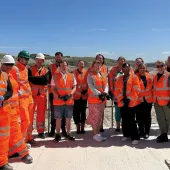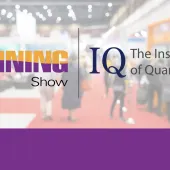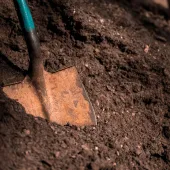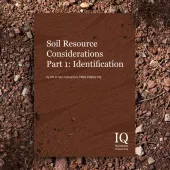Institute of Quarrying - The Recent Past

First published in the October 2017 issue of Quarry Management
Third part of a special supplement by Quarry Management to celebrate IQ's centenary
During this phase of the Institute’s development great changes took place in the industry in the UK. In particular, the ownership structure of quarry product-based assets became both heavily concentrated and dominated by foreign groups with significant cement interests. There was also a sea change in attitudes towards safety, health and environmental issues, which created a need for improved education, training and all forms of personal development.
This provided IQ with the opportunity to help to lead a movement to raise standards of professionalism within the sector through a range of education, training and CPD provisions, including branch meetings, conferences and special seminars. In addition, a range of eight Technical Handbooks on key subjects, such as Crushing and Screening, Health and Safety Law, and Sand and Gravel Production, was produced to allow both students and working managers to have access to industry-approved technical material set out at a greater level of detail than that provided by the individual learning unit at Doncaster College.
By the turn of the century, however, government policy was starting to turn away from providing funding for industry-specific courses in favour of those delivered to a standard required for inclusion within the National Qualifications Framework.
These changes, coupled with the increased pressure on industry to ‘raise the bar’ in education and training, resulted in a review of the educational course requirements and, in 2006, the decision was made to move the DAPS courses in Quarry and Asphalt Technology from Doncaster College to the University of Derby, so that they could be upgraded to Diploma status and delivered via the University’s e-learning platform.
As a significant investment in new e-learning materials was required, a deal was struck whereby all the industry-specific hard-copy learning materials used at Doncaster were purchased by the two institutes (IQ and IAT) so the content of the individual learning units could be re-implemented and enhanced for online delivery.
Also, as part of this arrangement IQ and IAT undertook to keep the e-learning materials up to date in return for an agreed proportion of the course fees generated by the University from their use (previously all course fees had been retained by the College although the examinations were both owned and charged for by the two institutes).
The implementation of the new system was very successful and at the end of 2008 the partnership between IQ, IAT and the University of Derby received national recognition when it was featured in the CBI ‘Stepping Higher’ report as an outstanding example of workforce development through an employer-led higher education initiative.
The next development was designed to extend the use of the e-learning materials overseas through the introduction of an online Certificate in International Quarry Operations for students anywhere in the world. As most of the basics of quarry operations are common around the world, this involved the e-learning units being reworked with references to UK legislation and regulation replaced with a combination of international standards and good practice.
Also, to leverage value for its investment in e-learning materials, IQ created bespoke packages for engineering companies such as Powerscreen and Sandvik, who wanted access to specific subject areas for training purposes.
In any event, the e-learning provision at Derby has continued to expand and now extends to 18 industry-related courses covering quarry, asphalt, concrete and clay products at levels from Higher Apprenticeship to Honours Degree. These courses now attract an annual cohort of around 500 students from the UK and overseas, which represents a 100-fold increase on the original five pioneers who took the first IQ exams!
In addition to developing academic qualifications, the Institute was also heavily involved with the establishment of competence qualifications at management level for the sector. In the mid-1990s NVQs (National Vocational Qualifications) were starting to be trialled by some quarrying companies and the industry training organization, then known as EPIC (now MPQC), floated a proposal to launch an NVQ for quarry managers.
At the time there was some disquiet over this idea because early adopters of NVQs had reported difficulties coping with the complex and bureaucratic nature of the qualifications. An industry committee comprising representatives of seven major companies was assembled to consider the pros and cons of the idea and, after discussion, it was agreed that the industry did not need NVQs at that point in time.
The IQ Education Committee, however, took a different view of the situation and concluded that some of its members would probably welcome the opportunity to gain a competence qualification relating to safety, health and environment if it were to be available as an addition to personal CVs.
Accordingly, consultants were engaged to produce a specification for what initially was an IQ Health and Safety Competence Certificate. This took a while to develop and, by the time a pilot scheme had been completed and the content had been extended to include environmental management, the HSE ‘Hard Targets’ initiative and other pressures conspired towards the industry adopting NVQs at management level, based on the development work that had already been undertaken by the Institute.
As EPIC Awarding Body was the designated awarding body for competence qualifications in the sector, the Qualifications and Curriculum Authority turned down a request for IQ to be allowed to deliver the awards. This meant that the ownership of the qualification, then under IQ copyright, had to be passed over to EPIC, which was agreed subject to a provision providing IQ with a share of the income from candidate registrations.
The rest, as they say, is history, and what had started out as an unwanted qualification very quickly became a ‘permit to work’ as employers saw the SHE Awards as the best way of demonstrating occupational competence for HSE-compliance purposes, as well as effecting practical improvements in the workplace.
Competence, of course, has to be kept up to date and, to this end, the Institute introduced its CPD system in 2003 with guidance that members should be undertaking at least 30 hours of developmental activity during the course of a year.
As an extension to the personal CPD system, the IQ Corporate Professional Competence Scheme (CPC) was launched in 2009 to provide companies with the opportunity to demonstrate that the whole of the workforce with responsibilities for safety, health and environment was fully competent.
The three requirements to obtain this status were: first, to ensure that their staff held an appropriate competence-based qualification; second, maintained up-to-date CPD records; and third, that company staff records were made available to IQ for annual scheme audit purposes.
Needless to say, this scheme was quickly adopted by those companies who were both organized and committed to leading the competence agenda, and continues to be well supported.
Conferences and seminars have always provided another important educational dimension for IQ. And although the conferences held in the UK in the last 30 years or so were not quite as grand as those in former times when employers had a more relaxed attitude to social activities, they have still provided some memorable moments.
Over the years, annual conference themes have covered virtually every subject of interest and relevance to the industry, with safety, health and environment recurring on a regular basis. In addition, many high-profile speakers have given their time to address the industry, such as environmental campaigner Professor David Bellamy in 1989, who is remembered for praising the industry for the positive contribution quarries made to the natural environment.
The most famous speaker in this era took to the platform in 2008 when Lord Sebastian Coe gave a presentation on the sustainability planning for the London 2012 Olympic Games as part of the conference focusing on ‘Developing London – meeting the green challenges’.
The most international conference was held in Harrogate in 1999 when IQ hosted the 2nd European Conference on Mineral Planning. The programme for this event consisted of 40 papers in three streams. It attracted speakers from 14 different countries and almost 100 international delegates.
During this period a number of international symposia were organized by IQ at the Palace Hotel, Buxton, on the day before the Hillhead exhibition opened. These seminars attracted delegates from all over the world but were eventually discontinued in favour of a range of on-site activities in the IQ marquee.
A series of seminars with strategic themes of importance to senior management were organized from the 1990s onwards in association with the London Business School and others. These events were well supported and attracted some very able speakers from the city, academia and management consultancy, as well as senior public sectors figures such as Sir Michael Latham and Sir Frank Davies.
The senior-management seminars were also followed up by a series of events for sales and commercial staff on sales management and negotiating skills, which collectively attracted several hundred delegates. In addition, a range of ‘one-off’ seminars were run by IQ when, for example, new legislation was being introduced to the industry.
During this period the local IQ branches mostly enjoyed a good level of support for both technical meetings and dinner dances, with the Scottish branch attracting more than 600 members and guests to its annual function in good times. In 1996, on taking office as President, Graeme Shove presented the Institute with a handsome trophy made from 6,000-year-old fenland bog oak inlaid with cut stone from quarries representative of the Institute’s 13 UK branches as the prize for a new competition for the branch which was deemed to have delivered the best overall programme in the preceding year.
Another valuable contribution made to the industry by branch activities was the introduction of ‘Quarry Safety Days’, which provided a means of delivering health and safety training/CPD to participants at all levels within the workforce in a quarry site environment in which blue collar employees felt at home. Also, at a time when members’ time is at a premium other innovations have been introduced to encourage involvement in branch activities, such as the annual ‘Quarry Question Time’ organised by the Derbyshire Branch in association with the University of Derby.
Outside the UK membership had continued to grow strongly once the overseas sections had become properly established, and by the time the Malaysian branch was formed in 1989, with Subrayan Subramaniam as Chairman, their combined membership was almost as numerous as that in the home country.
In view of the tyranny of distance, it had always been recognized that overseas branches would have to be both run and financed locally. Thus, for many years, the arrangement was that the bulk of subscriptions collected were retained in the country of origin and a per-capita fee was remitted to the UK. At this time all members received a copy of the Journal and were full voting members of the Institute.
As membership grew and the local organizations matured, the cost of subscriptions remitted to the UK became subject to discussion, particularly when exchange rates fluctuated and the pound sterling was strong! This issue ebbed and flowed for a few years until it was decided to offer the overseas Division in Australia and branches in South Africa, New Zealand, Malaysia and Hong Kong the opportunity of electing for a lower-cost option of becoming a free-standing corporate entity in their own right, which was affiliated to the parent organization in the UK.
After some discussion this concept was agreed and the UK constitution was amended in 1996 to allow overseas groups to continue to use the name and identity of the Institute, provided that they maintained a constitution in parallel with that in the UK and paid a small annual fee per member. The arrangement also provided for overseas members to have voting rights in their own organization, rather than the UK, and the Journal was supplied only to those who opted to pay an extra charge.
In order to create a proper forum for discussion at international level, the Presidents’ Committee was created with the intention of holding at least one meeting per year, with the six member countries acting as host by rotation. As the member countries are constituted as separate corporate entities (except Hong Kong), this committee has no executive power over the operation of the Institute as a whole and acts only in a consultative capacity.
- Subscribe to Quarry Management, the monthly journal for the mineral products industry, to read articles before they appear on Agg-Net.com








